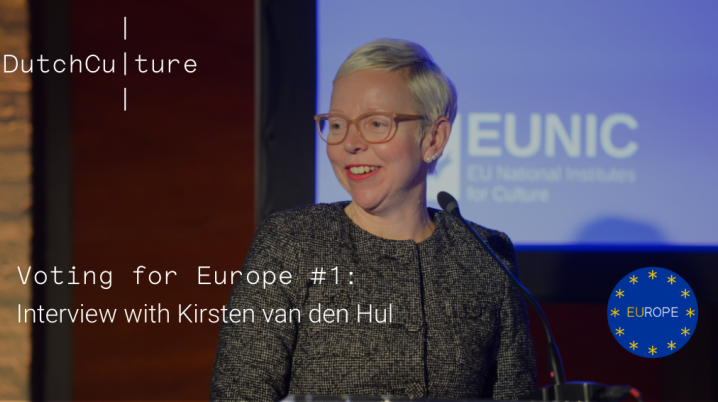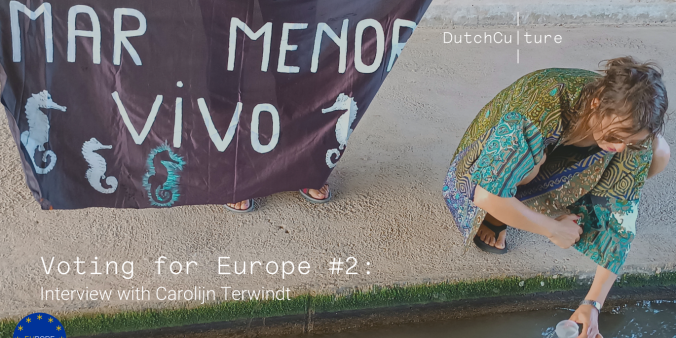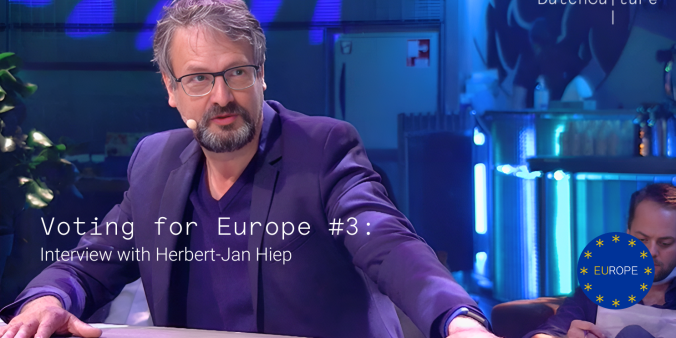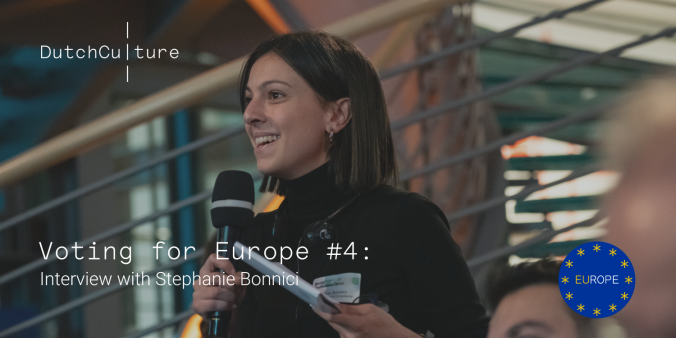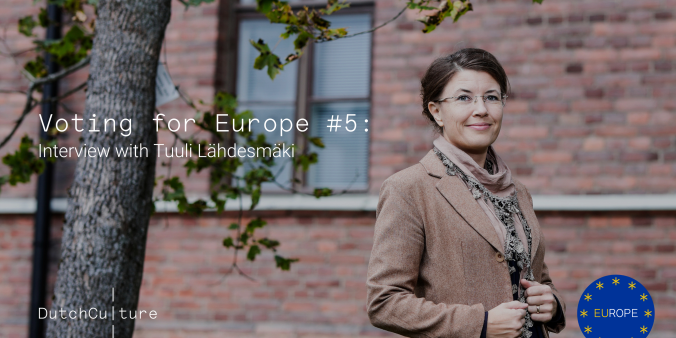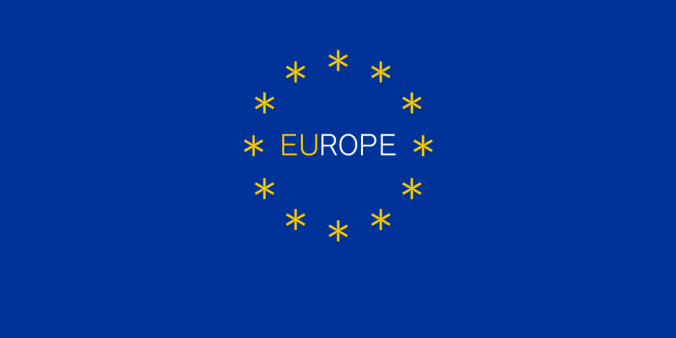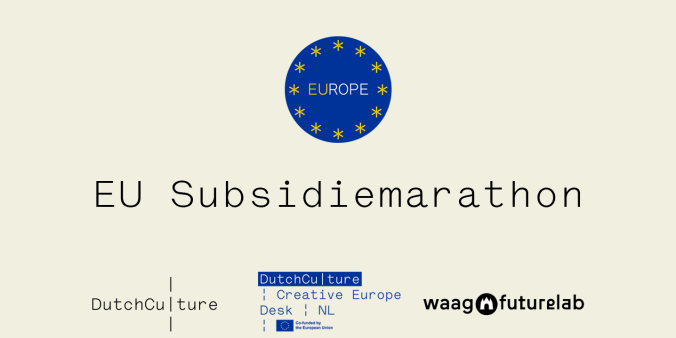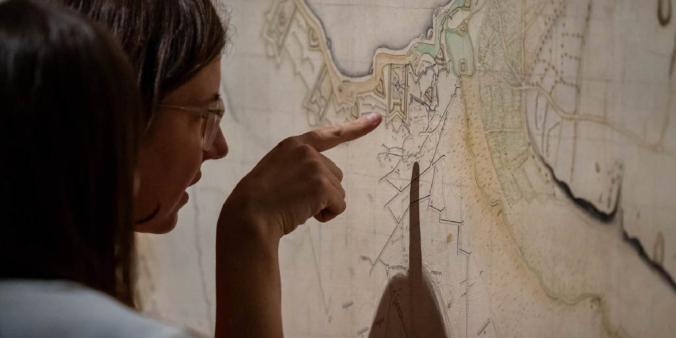During the upcoming European Parliament Elections from 6 to 9 June this year, citizens from 27 EU countries will have the opportunity to cast their votes. It is a crucial moment for the future of Europe and our planet, and will also shape European cultural policies in the years to come. Fundamental values such as democracy, human rights and freedom of speech are at stake.
This has prompted us to reflect on the role of culture in fostering a united Europe. In this interview series, we are eager to learn from artists and a wide range of cultural professionals about what Europe and the EU mean to them personally and for their practice. Additionally, we explore how cultural exchange can contribute to a stronger shared European social and cultural space.
Kirsten van den Hul, director of DutchCulture and board member of EUNIC Global
In this first interview we talk to Kirsten van den Hul, the director of DutchCulture, a board member of EUNIC Global, and a passionate advocate for gender equality and women's rights. Her career encompasses diverse roles, including tenure as a member of parliament for the Dutch Labour Party. In that role she focused on culture, education, emancipation and foreign trade.
Do you perceive yourself as European?
"I absolutely consider myself as European. I grew up in a very small village in the east of the Netherlands, near the German border, and we often watched German television. So, we experienced Europe as a daily reality. Europe definitely feels like home to me. I spent quite a large part of my life outside of Western Europe. Living and working in Eastern Europe and Tunisia gave me an extra perspective on what Europe is and how Europe is seen by the ‘other’ side, for instance from a Mediterranean or a postcolonial perspective. These experiences in my professional and personal life helped me explore Europe, and strengthened my Europeanness as a part of my identity. I feel more European than Dutch. I have felt that connection since I was young, when, for example, during a high school trip to Paris I discovered French Hip Hop, leading to a lifelong passion for the genre. We can travel without having to show our passports, we pay with the same currency, and we can study and work quite easily across borders, making them feel irrelevant. Being European means being part of something bigger than yourself."
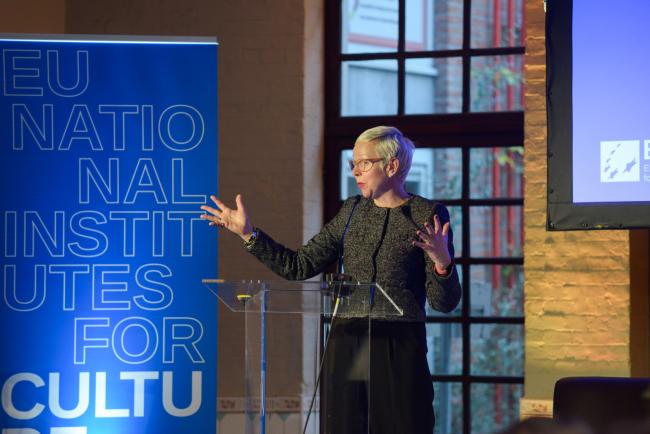
Aside from being the director of DutchCulture, since December 2023 you are also on the board of EUNIC Global. What motivated you to apply for this position?
"I think EUNIC is an interesting network, uniting very different cultural organisations and ministries that share the vision of cultural relations as being important for creating a better world. DutchCulture was already very active in the Dutch EUNIC cluster, which unites the different international cultural institutes based in the Netherlands. Being on EUNIC Global's Board of Directors gives access to this extensive network and allows DutchCulture, as one of the smaller members, to share its experiences. There's mutual reinforcement, particularly regarding relevant topics like climate action, which is a high priority for both DutchCulture and EUNIC. This is apparent from events such as EUNIC’s Climate Culture(s) Creative Lab in Berlin last year, in which DutchCulture participated. Another particular topic worth mentioning is the decolonisation of international cultural relations, on which we organised a knowledge-sharing workshop for our EUNIC colleagues. In these days of geopolitical divisions, tensions, and war on our continent, I feel that the power of cultural relations is even more important. So to work with this international network, and especially as a member of the board, is a unique position and I'm very happy and honoured to have been elected."
In this context of cultural collaboration, how important are the upcoming European elections?
"They are very important because there is a lot at stake. In many parts of Europe, including the Netherlands, we see a tendency towards nationalism, Euroscepticism and anti-immigration, often paired with a very conservative view on human rights or gender equality. Those voices are gaining strength, and it feels like the world is at a crossroads. What we need right now is a clear vision, and to invest in and make progress with respect to human rights, climate and international relations based on fairness and equality.
I think these elections really matter, even if for some people Europe feels far away. Europe means a lot more than we realise. It’s about creating sustainable living and working conditions, educational exchange, and investing in cultural cooperation. There's so much that Europe actually means, and culture plays a major role in that."
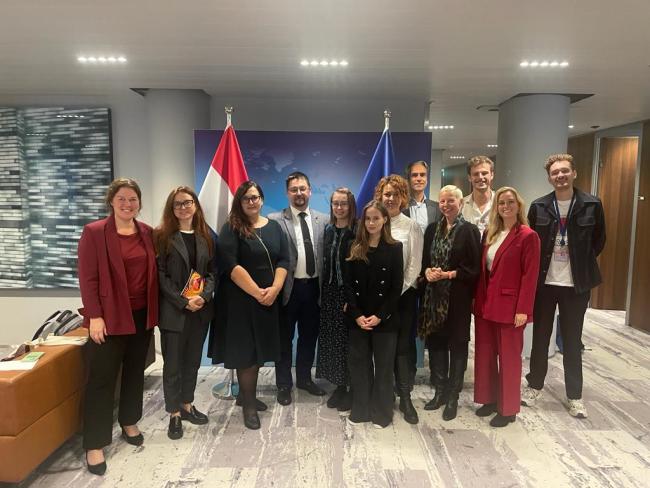
Can you share a specific example or experience that illustrates the impact of European cultural cooperation on your work?
"That is actually where my professional life started. One of my first jobs was at the European Cultural Foundation, an organisation with which DutchCulture still works very closely. At that time, I was part of a wonderful programme called Arts for Social Change. We collaborated with professional artists who often worked in very challenging circumstances. They worked, for example, with disenfranchised communities, or young people with no or hardly any access to cultural activities. In these cross-border cooperations, for instance, in former Yugoslavian countries, artists collaborated with communities who had not spoken with each other since the war, and who restarted their communication through art. For me, that is the power of art.
That power is also apparent when we, as DutchCulture, organise visitor programmes to allow cultural professionals from different countries to connect with their counterparts here. Last year Ukraine was added as a focal country for the Dutch international cultural policy, and since then we have organised 2 visitors programmes for Ukrainian cultural professionals. Both were so impressive, because the participants came from a country at war and their phones would ring whenever an air raid alarm went off back home. The connections forged here helped them to invest in the power of art and culture, which are literally under attack. It is essential to continue highlighting the voice of humanity and cooperation in a deepening crisis."
What challenges and opportunities do you see for cultural collaboration across European borders, and how do you think they can be tackled?
"Some challenges are very practical. Many artists from outside the Schengen zone still struggle to obtain the required visa. I speak to many who would love to work together but have a hard time travelling here, or even leaving their country. Funding for culture is another challenge, although we're very happy that there is such a thing as the Creative Europe programme. However, many initiatives still struggle to find funding, especially small or new ones. So there is definitely room for improvement. What I really like about the Creative Europe programme is that climate action is part of the funding criteria, just like gender equality and diversity and inclusion. If you can’t show how you address those themes, you don’t qualify. I think that is a very good and practical example of what you can do to raise the bar.
The big challenge is, of course, the climate crisis. It is important for us - as the cultural sector - to assume responsibility and to critically evaluate ourselves. Do we really need to travel physically? Can we organise something online? At DutchCulture for example, we have updated our travel policy so that for shorter trips we take the train instead of a plane."
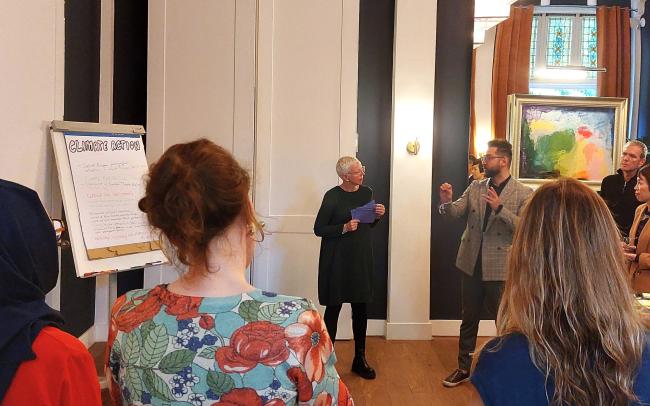
Do you have a message for the European people, for policymakers, MEPs, or other decision-makers about the importance of supporting and prioritising European cultural collaboration?
"I would say that culture is at the heart of Europe, that Europe is culture. To neglect culture is to not take Europe seriously. We urgently need cultural cooperation. There are voices today who paint culture as something elitist or a luxury, but that is a false frame. If you honestly examine your own life, you’ll find that culture is an intrinsic part of everybody’s daily world. It’s so important to keep investing in that, to keep it flowing freely because culture is a human right. Culture is about expressing identities and sharing ideas. We need that now more than ever. We will not solve the problems that the world, and Europe, are facing if we don't take culture seriously."
Is there European art you would like to recommend?
"The song Sorry by Dutch artist Colin Benders, formerly known as Kyteman, is incredibly beautiful. Also, I could watch the French film Intouchables a hundred times and it still would not be boring. Omar Sy in the leading role acts amazing in this movie and the music by Ludovico Einaudi fits beautifully. And, Dutch-Iranian author Sholeh Rezazadeh, nominee for the European Prize for Literature with her book Ik ken een berg die op me wacht. She is such an incredible literary talent."
Europe & DutchCulture
DutchCulture is connected to Europe in a number of ways. We work closely with the Dutch embassies in 24 focal countries worldwide, including nine in Europe. We establish collaborations with these countries in the field of culture and cultural heritage. With our Europe + Heritage programme, Dutch heritage professionals are stimulated and enabled to set up European heritage knowledge exchanges. We offer advice on the Creative Europe programmes and seek to shape the future of cultural relations through the EUNIC network.
